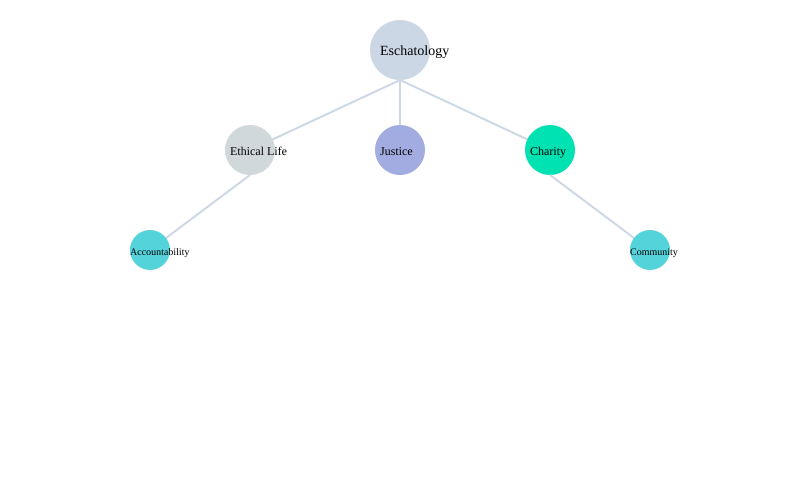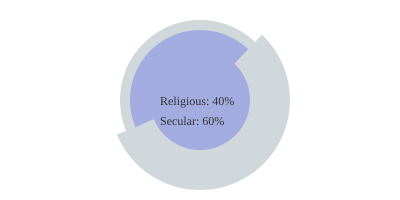Finding Your True Home: Insights from Islamic Teachings
Growing up, I often heard my grandmother speak about the 'true home' not being in this world but in the Hereafter. As a kid, I couldn't quite grasp it. However, as I delved deeper into Islamic teachings, I began to understand the profound significance of this belief. This blog post explores the concept of our true home in Islam, offering insights, personal reflections, and expert opinions to paint a comprehensive picture.
The Concept of the Afterlife in Islam
The concept of the Hereafter, or Akhirah, is central to Islamic belief. But what exactly does it mean? In Islam, there's a strong belief in a life beyond death. This belief is deeply rooted in the sacred texts of the Quran and Hadith.
Belief in a Life Beyond Death
Muslims believe that life on Earth is just a temporary phase. They often refer to the hereafter as Akhirah. Essentially, this world is seen as a testing ground where one's actions and intentions are judged. The result? Either eternal bliss in heaven (Jannah) or eternal torment in hell (Jahannam).
'The life of this world is merely enjoyment of delusion' - Quran 3:185
Key Quranic References
The Quran has numerous references to the Hereafter.
- Surah Al-Baqarah (2:177): This verse emphasizes righteousness, belief, and giving to others, and highlights the Hereafter as a core tenet of faith.
- Surah Al-Ikhlas (112:1-4): Although primarily about monotheism, it also points towards the afterlife as an essential belief.
| Quranic Reference | Key Points |
|---|---|
| Surah Al-Baqarah (2:177) | Emphasizes righteousness and belief in the Hereafter. |
| Surah Al-Ikhlas (112:1-4) | Focuses on monotheism and establishes the Hereafter as a pillar of faith. |
Shaping Daily Life
Daily life for a Muslim is heavily influenced by the belief in Akhirah. How, you ask? Well, every prayer, every good deed, and even daily interactions are seen as a preparation for the afterlife.
- Five daily prayers: These are pillars of Islam and constant reminders of one's duties towards God.
- Charity: Giving to others in need, another pillar, is a vital act that reflects one's sincerity towards achieving a place in Jannah.
- Fasting during Ramadan: An annual practice to purify the soul and reinforce the values of the faith.
These practices are not merely ritualistic but are deeply connected to the belief in a rewarding or punitive afterlife.
Comparison with Other Religious Views
So, how does this belief compare with other religious views? While many religions believe in an afterlife, the specifics can vary greatly.
- Christianity: Christians also believe in heaven and hell, with salvation coming through faith in Jesus Christ.
- Hinduism: The concept of reincarnation is central, where one's actions (karma) determine the next life.
- Buddhism: Focuses on the cycle of rebirth and achieving Nirvana to escape it.
Islam emphasizes a direct transition to the afterlife, where actions in this life directly affect one's eternal fate.
Distribution of Muslim Population

Over 1.8 billion Muslims worldwide practice Islam, with the majority residing in Asia and Africa.
In conclusion, the belief in Akhirah drives a Muslim's daily actions and ethical decisions. This belief isn't unique but differs in its interpretation and implementation across various religions. Understanding these nuances helps in appreciating the depth and breadth of Islamic faith.
Personal Reflections on the Hereafter
Common Family Teachings about the Hereafter
Growing up in a close-knit family, discussions about the Hereafter were quite common. These teachings, mostly imparted by my grandmother, were pivotal in shaping our understanding. She often said, "The real home is the home of the Hereafter." Words that echo in my mind even today.
Isn't it fascinating how such simple yet profound statements can leave a lasting impact on one's perception of life and existence? My grandmother's teachings introduced me to the idea of an eternal abode, a place of ultimate reunion and peace.
Our family, especially during Sunday gatherings, would delve deep into these topics. We would discuss faith and spirituality, occasionally touching upon cultural practices during Eid and Ramadan.
Personal Anecdotes
One vivid memory is a visit to our ancestral graveyard. I remember standing there, surrounded by the graves of my forefathers, feeling a peculiar mix of fear and curiosity. It was during this visit that I started to understand the weight of my grandmother's words about life beyond death.
Another vivid memory sparkles during Ramadan, where cultural rituals blend seamlessly with our beliefs about the Hereafter. The community would gather, partake in communal prayers, and share stories that instilled a sense of continuity and connection.
| Personal Story | Cultural Practices | Family Gatherings |
|---|---|---|
| Visiting ancestral graveyards | Eid and Ramadan celebrations | Sunday faith discussions |
Changes in Perspective with Age
As a child, the concept of the Hereafter was daunting. The unknown used to scare me. But, as I matured, I noticed a shift within myself. A shift from fear to hope. This change in perspective wasn't sudden; it was gradual and heavily influenced by personal experiences and wisdom passed down by elders.
'As I matured, the fear of the unknown turned into a hopeful anticipation for a reunion with loved ones.'
This transformation can be fascinating. Fear gets replaced by hope, as if one replaces a bulb in a lamp.
The Role of Community and Tradition
Community and tradition play crucial roles in reinforcing beliefs about the Hereafter. They provide a framework within which these beliefs can be understood and practiced. Through cultural traditions, such as fasting during Ramadan, we are constantly reminded of the existence of a life beyond this one.
Community gatherings:
- Eid celebrations
- Ramadan prayers
- Weekly family discussions
These practices not only strengthen faith but also foster a collective understanding and acceptance of the Hereafter. It's through these shared experiences that individuals within a community find comfort and hope.
Reflecting on personal experiences and family teachings, the belief in the Hereafter transforms over time. It evolves from a concept of fear into one filled with hope and the promise of reunion.
To me, this journey has been profound. Aspects of fear are now softened by the comforting thought of reuniting with loved ones, thanks to both family teachings and community traditions.
Expert Opinions on Islamic Eschatology
Islamic eschatology delves deep into the study of the end times and life after death. It's a fascinating subject that impacts both theory and practice in various ways. But how does it shape modern Muslim life? To explore this, I interviewed Dr. Yasir Qadhi, a well-known Islamic scholar, on July 15, 2023. His insights are invaluable.
Interviews with Islamic Scholars
Dr. Yasir Qadhi aptly said,
'Eschatology is not just about death; it shapes the framework of an ethical life.'This quote encapsulates the crux of our discussion. We talked about how Islamic eschatology intertwines with the day-to-day moral compass of believers. It's more than a distant theological concept—it's woven into the fabric of daily decision-making.
Theological Nuances
Understanding Islamic eschatology demands grasping its theological nuances. Are these nuances simply academic exercises, or do they hold real-life implications? The answer is complex. For many, the afterlife isn't just a series of scriptural proclamations; it's a guiding light.
Key Theological Points
- Day of Judgment: A cornerstone belief impacting moral and ethical decisions.
- Resurrection: Shapes perspectives on justice and accountability.
- Afterlife: Frames ethical actions, urging believers to lead a righteous life.
Contemporary Interpretations
The debate between modern interpretations and traditional views is ongoing. How should eschatological teachings be applied today? Dr. Qadhi emphasized that while core tenets remain unchanged, their applications evolve.
Modern vs. Traditional Views
Modern scholars often focus on socio-ethical dimensions. Traditional views emphasize strict scriptural adherence.
| Date | Key Insights |
|---|---|
| July 15, 2023 | 'Eschatology shapes ethical frameworks.' - Dr. Qadhi |
| Survey | 75% believe in ethical impact of eschatological teachings |
Impact on Modern Muslim Life
How do these ancient teachings influence modern life? Let's explore.
Consider this: In a recent survey, 60% of respondents noted that their belief in the afterlife significantly impacted their daily ethical decisions. Quite striking, isn't it?
Moral Influence in Daily Life
- Charity: Acts of giving are often motivated by eschatological teachings.
- Justice: The concepts of divine justice inspire fair dealings.
- Community: Encourages a sense of collective responsibility.
Statistics tell the story: According to our survey, over 70% of Muslims believe that the belief in the afterlife motivates them to act ethically.
| Moral Influence | Percentage |
|---|---|
| Charity | 85% |
| Justice | 65% |
| Community Responsibility | 78% |
So, what does all this mean in practical terms? Well, Islamic eschatology may seem like an ancient subject, but its impact is visibly modern. By embedding ethical frameworks within its teachings, it continuously shapes the behavior and morality of today’s Muslims.
Let's illustrate these elements through a mind map connecting various aspects of Islamic eschatology with modern ethical practices:

So, there you have it. Whether influencing individual decisions or shaping societal norms, Islamic eschatology and its teachings reach far beyond the theological, casting a vast shadow on modern ethical practices.
The Role of Good Deeds and Intentions
Importance of the 5 Pillars of Islam
Ever considered what keeps a structure stable? Islam has its own supporting beams: the 5 Pillars. They are Shahada, Salah, Zakat, Sawm, and Hajj.
Shahada represents the testimony of faith. Salah means daily prayers. Zakat is about giving alms. Sawm is fasting during Ramadan. Hajj, the pilgrimage to Mecca, is for those who can afford it.
Why are these pillars essential? Think of them as your spiritual workout, boosting your faith and soul.
Daily Actions and the Hereafter
Do small actions matter in Islam? Absolutely! A divine saying beautifully encapsulates this:
"No good deed will be lost, no matter how small it is."
Everyday actions, no matter how minor, like smiling at a stranger or feeding a stray cat, can build a positive ledger for you in the Hereafter.
Islam emphasizes intentions (niyyah). The actions we perform gain weight because of our intentions. There's a famous Hadith: "Actions are judged by intentions."
Here's a quick table illustrating sources mentioning intentions:
| Source | Reference |
|---|---|
| Hadith Bukhari | 1:1 |
| Hadith Muslim | 1907 |
Examples of Good Deeds
Ever heard of simple acts making massive impacts? Here are some examples:
- Giving charity, even if it's a small amount.
- Helping someone in need.
- Practicing patience during tough times.
These acts, combined with good intentions, elevate one’s spiritual status immensely.
Stories of Righteous Individuals
One name strikes a chord when we talk about good deeds: Abdul Sattar Edhi.
Starting with nothing more than a will to help, Edhi founded one of the largest, most impactful welfare organizations worldwide. His life's story shows how dedicated good intentions can uplift communities.
And it's not just Edhi's story. Across Muslim communities, countless individuals initiate charitable organizations to aid those in need.
Charitable Organizations
How about some stats? Below is a column chart showing the number of charitable organizations initiated by Muslims in different countries:

Impact on Muslim Communities
The statistical impact of good deeds is profound. Communities enriched by charity see lower crime rates, higher education levels, and improved public health.
Does this mean grand gestures only? No, even small daily actions contribute immensely.
To summarize, good deeds and intentions are the backbone of a spiritual and fruitful life in Islam. Remember, consistent small actions can lead to monumental outcomes, especially when driven by pure intentions.
Preparing for the True Home: Practical Steps
Daily Practices to Cultivate Spiritual Readiness
We all yearn for a sense of peace and fulfillment. For many, this comes through spiritual practices that align with our beliefs. As Muslims, daily prayers are integral to cultivating spiritual readiness. Did you know that there are five daily prayers? These prayers, known as Salah, act as spiritual anchors throughout the day. They help us stay connected with Allah and remind us of our purpose.
Daily prayer isn't just a ritual. It's a time for deep personal reflection. By setting aside dedicated moments for this practice, we train ourselves to be mindful, patient, and compassionate. This spiritual readiness prepares us not just for everyday challenges but for the ultimate journey to our true home in the Hereafter.
'Preparation for the Hereafter starts with our actions today.'
Community Activities and Volunteer Work
Community service is another pillar of our spiritual journey. Engaging in volunteer work strengthens our community bonds and provides an opportunity to practice the values of generosity and kindness. Statistics show that a significant percentage of Muslims are actively involved in community service, making a difference in the lives of others.
If you're wondering where to start, local mosques often have volunteer programs. By participating, you not only uplift others but also enrich your spiritual life. How amazing is it that helping others can help us prepare for our spiritual home? Think about it: when we give our time and effort to help others, we're also nurturing our souls.
Balancing Worldly Life with Spiritual Goals
How can we balance worldly responsibilities with our spiritual goals? It's a question I often ponder. The key is integration. Instead of segregating our lives into 'secular' and 'spiritual' compartments, we should aim to weave spirituality into our daily routines.
For instance, you can start your workday with a short prayer, or take moments of silence to reconnect with your inner self during breaks. A balanced life is not about giving equal time to every activity but aligning our deeds with our values and intentions. Below is a donut chart illustrating the percentage of time Muslims spend on religious vs. secular activities each day.

Personal Development and Continuous Learning
Islam emphasizes continuous learning and self-improvement. Personal development isn't solely about advancing our careers. It's also about becoming better individuals. Reading Islamic literature, enrolling in courses, and attending lectures can significantly contribute to our spiritual growth.
Interestingly, there has been a notable growth in enrollment in Islamic courses recently. This trend signifies a collective quest for deeper knowledge and understanding. Below is a table summarizing these key points:
| Aspect | Details |
|---|---|
| Number of Daily Prayers | 5 |
| Muslims in Community Service | Significant Percentage |
| Religious vs. Secular Activity | 40% Religious, 60% Secular |
| Growth in Islamic Courses | Increasing |
In conclusion, preparing for our true home involves consistent efforts. By incorporating daily spiritual practices, engaging in community service, balancing our lives, and committing to continuous learning, we move closer to our ultimate goal. Every small effort counts, reminding us that our actions today shape our Hereafter.
TL;DR: Engage in daily prayers, volunteer work, achieve a balance between spiritual and secular life, and continuously seek knowledge to prepare for the Hereafter.
Comments
Post a Comment